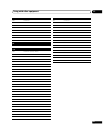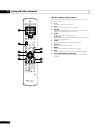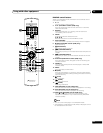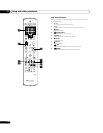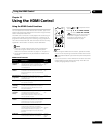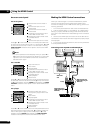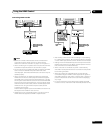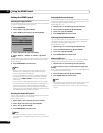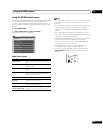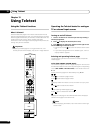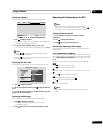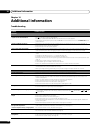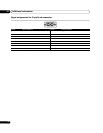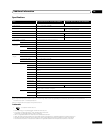
Additional information
14
72
En
Chapter 14
Additional information
Troubleshooting
Problem Possible solution
GENERAL
• No power.
• System cannot be switched on.
• Is the power cord disconnected? (See page 18.)
•Has a switch been turned on? (See page 20.)
• Check if you pressed buttons 0 to 9 or on the remote control unit. (See page 20.)
• If the indicator on the system lights up red, press 0 to 9 or on the remote control unit or STANDBY/ON on the
plasma television.
• Power is suddenly turned off. • The system’s internal temperature has increased. Remove any objects blocking vent or clean. (See page 15.)
• Check the power control setting. (See page 36.)
• Check the sleep timer setting. (See page 49.)
• The system cannot be operated. • External influences such as voltage malfunction, static electricity, etc., may cause improper operation. In this
case, operate the system after unplugging the power cord and re-plugging it in after one or two minutes.
• Remote control unit does not operate. • Is the TV indicator on the remote control unit lighted? Press SELECT on the remote control unit to select the TV
mode.
• Are batteries inserted with polarity (+, –) aligned? (See page 18.)
• Are batteries worn out? Replace with new batteries. (See page18.)
• Operate the remote control unit while pointing it toward the remote control sensor on the plasma television. (See
page 19.)
• Are you using it under strong or fluorescent lighting?
• Is a fluorescent light illuminated to remote control sensor?
• Check if any obstacles exist between the remote control unit and the remote control sensor.
• Panel sounds /noises. • Panel generated sounds—for example, fan motor noise, electrical circuit humming , glass panel buzzing—are
normal operation of a phosphor-based matrix display.
• When you change the Energy Save mode, you may notice a change in the panel sound. This is normal.
PICTURE/SOUND
• Screen appears dark. • Check if any obstacles exist in front of the Room Light Sensor. (See pages 12 and 48.)
• No image and audio is presented. • Have you finished initial scanning for digital TV channels? (See page 27.)
• Check if the input source for video or PC has been unintentionally selected although you want to watch a TV
channel. (See page 21.)
• Check if you have selected a channel blocked with Child Lock. (See page 28.)
• Enter a password to temporarily cancel Child Lock. (See page 49.)
• Check the cable connection with the antenna. (See page 17.)
• Check the cable connection with the other equipment. (See pages 51 to 56.)
• No picture. • Is connection to other components correct? (See pages 51 to 56.)
• Is a non-compatible PC signal being input? (See page53.)
• Audio is output but no image is presented. • Check if you have selected “Picture Off” for Energy Save. With this option selected, the screen is deactivated: only
sound is output. To restore the screen display, press any button other than (Sound Effect), i +/i – or
e (See page 36).
• Images are presented but no audio is
output.
• Check if you have selected the minimum volume. (See page 21.)
• Check that no headphones are connected.
• Check that the sound is not muted. (See page 21.)
• Check that the audio input is also connected. (See pages 51 to 53.)
• Check the sound system selected for a TV channel where problems have occurred (see page 22). Reselect the
correct sound system.
• Check that the appropriate DIGITAL OUT (PCM or Dolby Digital) is selected.
• Sound is reversed between
the right and left speakers.
• Sound is output from only a single speaker.
• Check if the speaker cable connections have been reversed between the right and left or if the speaker cable from
either speaker has been disconnected (for PDP-508XDA only). (See page 13.)
• Has the balance been correctly adjusted? (See page 35.)
• Picture is cut off. • Is the image position correct? (See page 45.)
• Has the correct screen size been selected? (See page 46.)
• Strange colour, light colour, dark or colour
misalignment.
• Adjust the picture tone. (See pages 30 to 33.)
• Is the room too bright? The picture may look dark in a room that is too bright.
• Check the colour system setting. (See page 46.)



